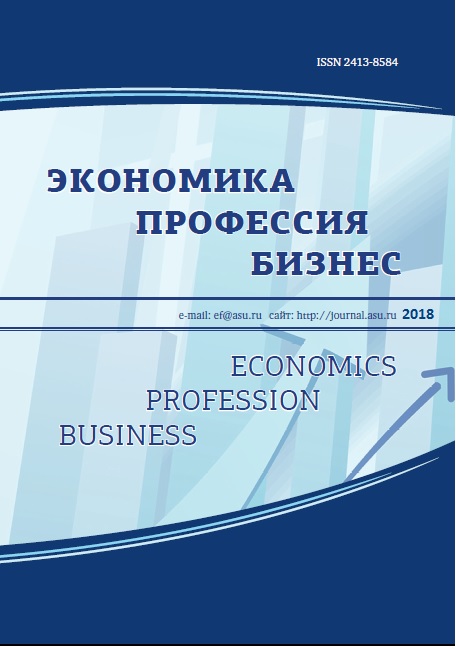REDUCING OF URBAN MIGRATION OUTFLOW IN VOLOGDA OBLAST
Abstract
The article considers the problem of reducing the population of the Vologda Oblast, is one of the reasons is the migration outflow of citizens. Identified the causes of the relocation of population to other regions and proposed measures to reduce the outflow eof citizens from the Vologda Oblast.Downloads
Metrics
References
Исаян Г. В. Теоретические подходы к исследованию трудовой миграции // Современные научные исследования и разработки. 2017. № 3 (11). С. 340–344.
Карасова А. А. Эволюция теоретических подходов к исследованию миграции как экономической категории // Ученые записки Санкт-Петербургского университета управления и экономики. 2015. № 1 (49). С. 110–120.
Слободчикова Д. В., Строева Г. Н. Миграция населения: теоретические аспекты // Ученые заметки ТоГУ. 2016. № 4. С. 900–907.
Трофимов Е. А., Трофимова Т. И. Экономико-теоретические аспекты факторов миграции рабочей силы // Известия Иркутской государственной экономической академии. 2015. № 4. С. 577–582.
Чернега О. Б., Бондаренко И. С. Теоретические аспекты миграции населения: эволюция подходов и научных школ // Вестник Тюменского государственного университета. Социально-экономические и правовые исследования. 2016. № 1. С. 150–165.
Якшибаева Г. В. Некоторые теоретические и методические аспекты в исследовании трудовой миграции // Актуальные вопросы экономической теории: развитие и применение в практике российских преобразований : материалы VI Междунар. науч.-практ. конф. 2017. С. 258–262.
Федеральная служба государственной статистики. [Электронный ресурс]. URL: http://www.gks.ru
REFERENCES
Isayan, G. V. (2017). Theoretical approaches to research of labor migration. Modern Research and Development, 3 (11), 340–344 (in Russian).
Karasova, A. A. (2015). Evolution of theoretical approaches to migration research as economic notion. Scientific Notes of St. Petersburg University of Management and Economy, 1 (49), 110–120 (in Russian).
Slobodchikova, D. V., Stroeva, G. N. (2016). Population migration: theoretical aspects. Scientific Notes of PSU, 4, 900–907 (in Russian).
Trofimov, E. A., Trofimova, T. I. (2015). Economical and theoretical aspects of labor migration factors. Proceedings of Irkutsk State Economic Academy, 4, 577–582 (in Russian).
Chernega, O. B., Bondarenko, I. S. (2016). Theoretical aspects of population migration: evolution of approaches and scientific schools. Bulletin of Tyumen State University. Social, Economic and Legal Researches, 1, 150–165 (in Russian).
Yakshibaeva, G. V. (2017). Some theoretical and methodical aspects in research of labor migration. Topical issues of the economic theory: development and application in practice of Russian transformations. Proceed. VI Int. Sc. Conf., 258–262. (in Russian).
Federal State Statistics Service. Available from: http://www.gks.ru/ Accessed on 20.01.2018 (in Russian).
Copyright (c) 2018 Economics Profession Business

This work is licensed under a Creative Commons Attribution 4.0 International License.
Economics Profession Business is a golden publisher, as we allow self-archiving, but most importantly we are fully transparent about your rights.
Authors may present and discuss their findings ahead of publication: at biological or scientific conferences, on preprint servers, in public databases, and in blogs, wikis, tweets, and other informal communication channels.
Economics Profession Business (EPB) allows authors to deposit manuscripts (currently under review or those for intended submission to EPB) in non-commercial, pre-print servers such as ArXiv.
Authors who publish with this journal agree to the following terms:
- Authors retain copyright and grant the journal right of first publication with the work simultaneously licensed under a Creative Commons Attribution License that allows others to share the work with an acknowledgement of the work's authorship and initial publication in this journal.
- Authors are able to enter into separate, additional contractual arrangements for the non-exclusive distribution of the journal's published version of the work (e.g., post it to an institutional repository or publish it in a book), with an acknowledgement of its initial publication in this journal.
- Authors are permitted and encouraged to post their work online (e.g., in institutional repositories or on their website) prior to and during the submission process, as it can lead to productive exchanges, as well as earlier and greater citation of published work (See The Effect of Open Access).









